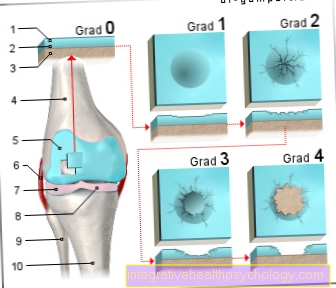Medicines for sore throats
introduction
During a cold, a viral or bacterial infection, a sore throat can often be the first symptom. Sometimes they only appear in the process.
The pain can be felt at rest, when speaking or swallowing. Treating the sore throat should be considered, especially if you have difficulty swallowing, which often makes it difficult to drink and eat.
Rapid normalization of fluid intake is important in children. In order to alleviate the symptoms and accelerate healing, various medications are available in tablet form, as gargle solutions or sprays. With each application it should be noted that the medication often only works superficially and therefore only relieves the symptoms for the most part.
If the sore throat does not improve, a doctor should be consulted to investigate the cause of the sore throat.

What over-the-counter medications are there?
Over-the-counter drugs for sore throats can be easily bought in pharmacies or sometimes even in drugstores without having to see a doctor. On the one hand, normal pain medication such as ibuprofen, paracetamol can be taken. These drugs can also be given to children.
- Pain medication
The ibuprofen also has an anti-inflammatory effect and can therefore curb the inflammation in the throat caused by the infection.
The paracetamol can lower possible fever. If ibuprofen or paracetamol are taken to prevent swallowing problems, this should be done at least half an hour before the intake of food.
Flurbiprofen is another product that can be purchased over the counter at the pharmacy. These are lozenges that can be used for sore throats. The lozenge has a pain-relieving and anti-inflammatory effect directly on the mucous membrane of the throat. It should be noted, however, that Flurbiprofen is not used in children under 12 years of age.
- Lozenges
Lozenges with other ingredients such as Icelandic moss or sage can also relieve the discomfort in the throat or moisten the mucous membrane in the throat and thus accelerate healing. Lemocin® can also inhibit the spread of the infection and alleviate existing symptoms.
- Gargle solutions and sprays
Gargle solutions can also be used against bacterial infections of the throat - e.g. with chlorhexidine - reduce the discomfort in the throat. Sprays containing the active ingredient chlorhexidine can also be used for sore throats.
- Nasal sprays
Furthermore - especially with a stuffy nose - care should be taken to breathe freely with nasal sprays. If you only breathe through the mouth, the lining of the throat dries out, which can exacerbate the sore throat. Which dosage form is suitable should be decided individually. Gargle solutions can often not be used with small children because they do not yet know exactly how gargle works. Different drugs can also be combined.
Are you more interested in this topic? You can read more interesting information about this under: Sore throat - the quick way to get rid of it!
What prescription drugs are there?
On the one hand, strong pain relievers such as ibuprofen require a prescription from a dosage of 600 mg. Novaminsulfon 500mg also requires a prescription and can be taken for a sore throat.
This medication is also available in drop form, the dose of which can be varied better than tablets. This allows better adaptation to the degree of pain. In addition, if you have difficulty swallowing, taking the liquid drops is often easier than taking tablets. Novaminsulfon is not only pain-relieving but also anti-inflammatory.
Lozenges that contain local anesthetics such as benzocaine require a prescription.
If it is a bacterial inflammation that should be treated with antibiotics, a prescription must also be written by the doctor. For example, streptococci can cause sore throats in about 30% of cases (Tonsillar angina) trigger.Penicillins or cephalosporins are then often given, which work against the bacterial infection and thus directly combat the cause of the sore throat.
If other bacteria are responsible for the infection, the type of antibiotic may need to be adjusted.
You can read more, more helpful information on this topic in our next article: Sore throat - what to do ?, When should I see a doctor with a sore throat?
What sprays are there?
Sprays are sprayed onto the lining of the throat, where they form a film on the mucous membrane. This film is supposed to protect the already irritated throat, to cleanse the throat of viruses and bacteria and to have an anesthetic and anti-inflammatory effect. This is done through various active ingredients that are contained in the sprays.
On the one hand, there are sprays such as EMS® Acute Throat Pain Spray. This contains various oils such as eucalyptus oil, peppermint oil, rosemary oil and thyme oil. Another spray for sore throats is Tantum verde®, which contains benzydamine hydrochloride and has an anti-inflammatory effect.
Sprays from various manufacturers that contain chlorhexidine can also be used for sore throats. Chlorhexidine has an antibacterial effect and thus combats inflammation-causing bacteria in the mouth and throat. It should be noted that chlorhexidine should not be used in children under 2 years of age.
There are also sprays that contain flurbiprofen. Here too, Flurbiprofen has a pain relieving and anti-inflammatory effect without numbing the throat area. Dequonal® spray has an antibacterial and antiviral effect.
Lidocaine sprays also relieve pain and are anti-inflammatory. They have a local anesthetic effect, because they usually contain the local anesthetic lidocaine and so relieve symptoms. Salt water sprays such as Emser® throat and throat spray can also be used for sore throats. These sprays help moisturize the lining of the throat, which can protect the sore throat and relieve sore throats.
Are you interested in further treatment options for a sore throat using a spray? Read more about this in our next article: Spray for a sore throat
Which lozenges can help against a sore throat?
On the one hand there are locally anesthetic lozenges for a sore throat. These contain local anesthetics that numb the throat while sucking. For example, there are lozenges that contain benzocaine, which can relieve sore throats and swallowing difficulties with local anesthesia after a few seconds.
The active ingredient benzydamine is also contained in various lozenges and, like the spray, has an anti-inflammatory, analgesic and antibacterial effect when sucking. An example of this would be Neo-Angin® throat tablets.
Other lozenges such as Mucoangin® for sore throats have a pain-relieving effect thanks to Ambroxol. Lozenges that contain flurbiprofen - such as Dobendan Direkt® - can also help relieve pain and inflammation in the throat.
GeloRevoice® are lozenges that form a protective film on the inflamed throat so that the mucous membrane is moistened and protected from drying out. The effect of this type of tablet differs from the other tablets in that it is neither anti-inflammatory nor directly pain-relieving.
Dorithricin® has an antibacterial, antiviral and analgesic effect. It contains benzocaine for pain relief. Tyrothricin and benzalkonium chloride work against viruses and bacteria.
What are the alternatives to medication?
The alternatives to medication are first of all general measures. For example, it is important to drink a lot. This moisturizes the mucous membranes and gives the tissue a better basis to fight pathogens. The throat is also moistened by sucking sweets containing, for example, sage.
Furthermore, the neck should be kept as warm as possible. Moist neck wraps can also be used for a sore throat. However, care should be taken not to freeze. For a neck wrap, a damp cloth is placed on the neck. On the one hand, this ensures that the pain and swelling in the throat are reduced. A dry one is wrapped around the damp cloth. The whole thing can be attached with a scarf.
Teas with honey - for example chamomile tea - can also be used for pain relief. Chamomile tea, for example, has an antibacterial and anti-inflammatory effect. The honey also has an anti-inflammatory and disinfectant effect. It is also beneficial for the irritated throat.
Are you more interested in other treatments for sore throats? Read more about this in our next article: Home remedies for a sore throat
What medication for sore throats can I take during breastfeeding and pregnancy?
During pregnancy and breastfeeding, drugs or their active ingredients may be transferred to the child via the mother's blood and then via the umbilical cord or, after birth, via the breast milk. Therefore, a doctor should be consulted before taking medication during pregnancy or breastfeeding.
Products such as Mucoangin®, Mucosolvan® or Paediamuc®, which are used as lozenges for sore throats, contain the active ingredient ambroxol. According to current studies, this agent can be used during pregnancy and breastfeeding.
Ibuprofen for a sore throat can be taken in the first two thirds of pregnancy, but should not be used in the last third. Paracetamol, on the other hand, can be taken for pain throughout pregnancy. Ibuprofen and paracetamol can also be taken when breastfeeding, if necessary.
Xylometazoline can also be used as a nasal spray during pregnancy and while breastfeeding to maintain free nasal breathing in order to protect the mucous membrane of the throat. Emser® throat and throat spray can be used safely during pregnancy and breastfeeding if you have a sore throat.
The use of superficial antiseptics such as dequalinium chloride should generally not cause any damage to the fetus or infant. But here too, you should consult your doctor before taking it.
The use of chlorhexidine should be avoided during pregnancy and breastfeeding and only with the permission of the doctor.
Lozenges, sprays and gargle solutions containing flurbiprofen should also not be used during pregnancy and breastfeeding. The same applies to agents containing benzocaine, as insufficient data exist on the effects on the fetus or infant. However, if there is a need, this should only be done after consulting the attending physician.
More interested in this topic? Read more helpful information on this at: Paracetamol while breastfeeding
Biochemical excursus: active ingredients and effects of drugs against sore throats
On the one hand, there are the local anesthetics lidocaine and benzocaine as active ingredients. When applied locally to the mouth and throat, these numb the nerves in the mucous membranes by blocking voltage-dependent sodium channels. This blockage temporarily prevents the action potential from being passed on.
Chlorhexidine, which is found in sprays, gargle solutions and also mouthwashes, is an antiseptic. It has an antibacterial effect by destroying the cell membrane of bacteria and thereby killing them. Another antiseptic is dequalinium chloride. It also works on the cell walls of bacteria and inactivates bacterial enzymes, thereby killing them. In addition, it is also effective against fungi (antifungal), although this mode of action has not yet been clarified.
The antiseptic benzalkonium chloride inhibits the growth of bacteria by being built into the cell walls of the bacteria. The active ingredient cetylpyridinium chloride, which is contained in Dobendan® Strepsils, for example, is also antiseptic and antibacterial.
Flurbiprofen and ibuprofen belong as active substances to the group of non-steroidal anti-inflammatory drugs and inhibit an enzyme. This enzyme is called cyclooxygenase (in short: COX). The COX is increasingly formed during inflammatory processes, promotes the inflammatory reaction in tissues and thereby also increases pain. The inhibition reduces inflammation on the one hand and pain on the other. Also novaminsulfon (Metamizole) inhibits the sore throat by switching off the COX.
Recommendations from the editorial team
Read more general information on this topic:
- Home remedies for a cold
- Sore throat and difficulty swallowing - what to do?
- Fever and sore throat
- Runny nose and sore throat
- Causes of Sore Throat
Exclusion of liability / disclaimer
We would like to point out that medication must never be discontinued, applied or changed independently without consulting your doctor.
Please note that we cannot claim that our texts are complete or correct. The information may be out of date due to current developments.





























